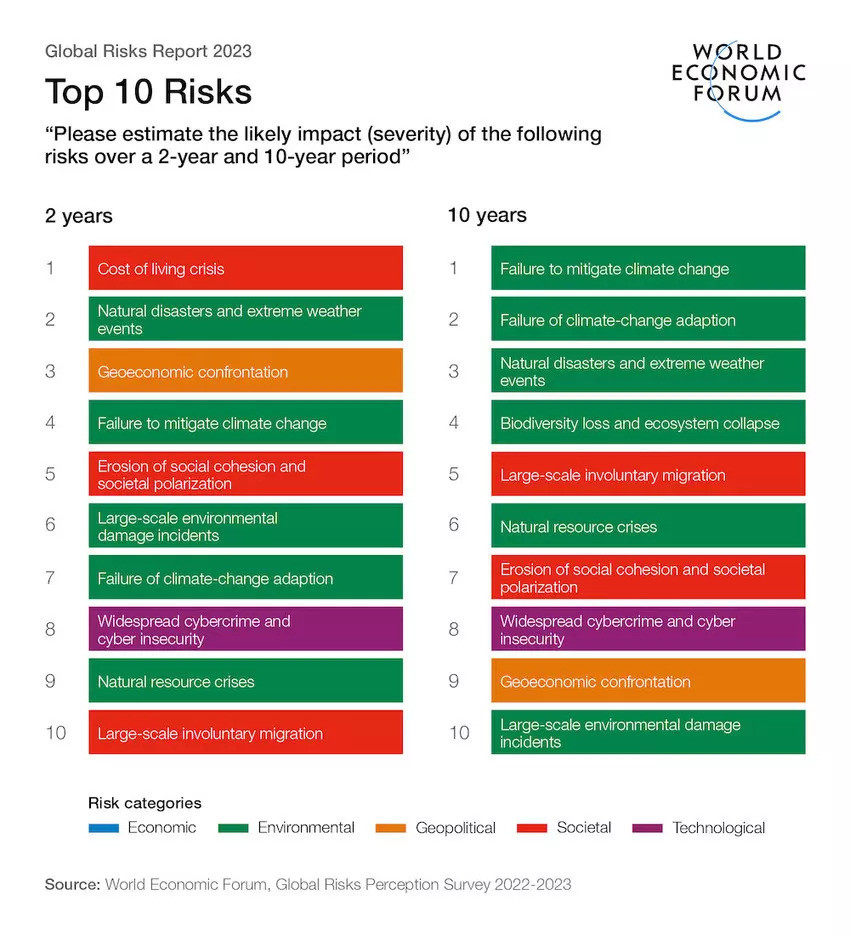23 Jan Global Risks Report 2023
Global Risks Report 2023
This article covers “Daily current affairs for UPSC “and the topic is ‘Global Risks Report 2023’ which is in the news, it covers the “Indian Economy” In GS-3, and the following content has relevance for UPSC.
For Prelims: About Polycrisis, Global risks report 2023
For Mains: GS-3, Indian Economy
Why in the news:
In its “Global Risks Report 2023,” the World Economic Forum forewarned that the Russia-Ukraine war could lead to several crises around the world.
About Polycrisis
- The French complexity theorist Edgar Morin coined the term “polycrisis” in the 1990s.
- When numerous crises in numerous global systems become causally intertwined in ways that drastically worsen the prospects for humanity. If their host systems weren’t so intricately linked, these interacting crises would do more harm than the total harm they would individually.
- Former European Commission President Jean-Claude Juncker coined the term “polycrisis” to describe Europe’s explosive position in 2016, which included debt with Brexit, climate change, and a refugee crisis.
Polycrisis by World Economic Forum
- A collection of threats that feel both entirely new and uncannily familiar are being faced by the world, according to the report.
- A poly-crisis could result from the interaction of several dangers, some of which are more established and well-known and others that are new and emergent.
- Older risks: These include inflation, a crisis in the cost of living, trade disputes, capital flight from emerging countries, a large-scale civil upheaval, geopolitical conflict, and the threat of nuclear war.
- Recent changes: Among them are unmanageable debt levels, a new era of slow growth, low global investment, deglobalization, a reduction in human development, and the intensifying effects of climate change.
Global Risks According to the report
- Short-term risks:
It includes escalating living expenses, sluggish economic expansion, and limited global food and energy supplies.
- Long-term hazards:
It includes the failure to adapt to climate change, the failure to prevent it, extreme weather occurrences, and the prospect of the extinction of species.
The research says that by the end of the decade, these risks could combine into a polycrisis.

Global Risks Report 2023
The causes of these risks
Current events
Energy and food prices skyrocketed as a result of the conflict in Ukraine. A global cost-of-living problem that resulted from the ensuing inflationary pressures sparked societal discontent.
The globe is currently dealing with a remarkable variety of crises at once, from the COVID-19 pandemic’s reverberating effects to global wars and conflicts, from high inflation and slow economic growth to increasingly catastrophic weather phenomena.
Additionally, as economies recovered from the pandemic, carbon emissions grew further.
Constant occurrences
Due to population expansion and socioeconomic progress, there is an increase in the need for food, water, and energy.
The growth of renewable energy systems is driving an enormous demand for rare minerals and metals.
The mismatch between supply and demand for certain resources could have disastrous effects, such as ecological collapse, trade wars, and interstate warfare.
The report outlines four scenarios that could result in a humanitarian and ecological crisis, ranging from water wars and famines to continued overexploitation of ecological resources and a delay in climate mitigation and adaptation. These scenarios center on food, water, metals, and mineral shortages.
Observations based on the Global Risks Report
Similar foresight exercises might assist foresee potential links, guiding preparatory actions towards decreasing the extent and scope of polycrises before they happen, given the unclear relationships between global hazards.
In such a circumstance, many governments have shifted their priorities to address immediate threats, such as food or energy shortages, at the expense of disregarding climate change and global development when they are most necessary.
It calls on world leaders to address the problem of trust erosion. “Addressing the erosion of trust in multilateral processes will strengthen the safeguards we have in place to address well-established dangers and enhance our collective ability to prevent and respond to emerging cross-border crises,”.
To create a road toward a more optimistic, inclusive, and stable world, it further calls for leaders to act jointly, decisively, and with a long-term perspective.
Other reports published by WEF are:
- Energy Transition Index.
- Global Competitiveness Report.
- Global IT Report
- WEF along with INSEAD, and Cornell University publishes this report.
- Global Gender Gap Report.
- Global Risk Report.
- Global Travel and Tourism Report.
Source:
Daily Current Affairs for UPSC
In Govt. competitive examinations such as UPSC, SSC, Bank, PCS, and others, All examinees have to face different examinations. The examinations include the Prelims, Mains, and Interviews. For passing this examination, all aspirants should gather national and international world. The aspirants have to read current affairs regularly for gaining national and international news. Reading daily current affairs also helps to enhance the general knowledge of the aspirants.
So, they should collect daily current affairs for the UPSC exam preparation. Here, Plutus IAS delivers the best daily current affairs for the UPSC examination. So, The aspirants can collect the daily current affairs for our sites today and read them properly. They can also collect weekly, and monthly current affairs for IAS exam preparation.



No Comments